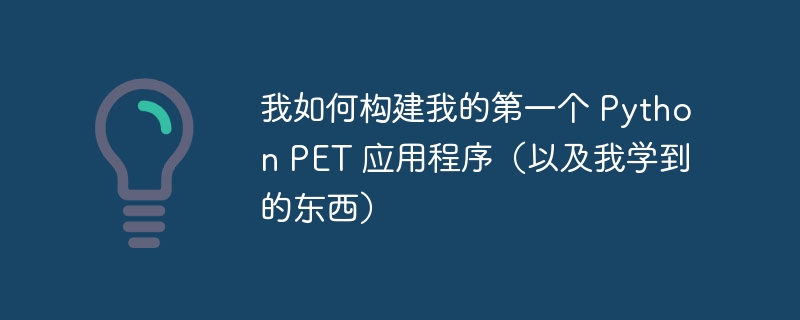◎欢迎参与讨论,请在这里发表您的看法、交流您的观点。
我如何构建我的第一个 Python PET 应用程序(以及我学到的东西)
ID:19442 / 打印
您好,dev 社区!我是 andre,一位热衷于深入 python 世界的初学者程序员。在与动力斗争了几年之后,我决定将注意力转移到构建真正的项目上。今天,我想分享关于创建我的第一个 python 项目的故事:个人支出跟踪器 (pet) 应用程序。 (代码在最后)
个人开支跟踪器是一款命令行应用程序,旨在帮助用户记录日常开支、对其进行分类并深入了解他们的消费习惯。我的目标是创建一种工具,使用户能够控制自己的财务。 (还有我的!啊哈)
我面临的最重大挑战之一是弄清楚如何有效地存储费用数据。我最初在 python 中处理文件时遇到了困难,但经过一番坚持,我终于实现了一个可行的解决方案!
通过这个项目,我了解了用户输入验证和确保数据记录一致的重要性。我还获得了使用 python 管理文件以存储和检索费用记录的宝贵经验。
立即学习“Python免费学习笔记(深入)”;
展望未来,我计划集成数据可视化功能,帮助用户直观地看到他们的消费模式。另外,我很高兴能够实现一个预算工具,允许用户按类别设置支出限额。
完成个人支出跟踪器是一次非常有益的经历,增强了我作为开发人员的信心。我渴望继续我的后端开发和 devops 学习之旅,更多项目即将到来!
我很想听听您的反馈!如果您构建了类似的东西或有增强费用跟踪器的技巧,请分享您的见解!
`
def pet():
print(“欢迎来到 pet!”)
print(“您的个人开支跟踪器,帮助您跟踪您的开支。”)
print("费用类别:")
print("[1] 食品和杂货")
print("[2] 交通(燃油、公共交通等...)")
print("[3] 公用事业(电力、水、互联网等...)")
print("[4] 娱乐休闲")
print("[5] 医疗保健和医疗费用")
print("[6] 租金和抵押贷款")
print("[7] 杂项(任何未分类的费用)")
categories = [ "Food & Groceries", "Transportation (Fuel, Public Transportation, etc...)", "Utilities (Electricity, Water, Internet, etc...)", "Entertainment & Leisure", "Healthcare & Medical Expenses", "Rent & Mortgage", "Miscellaneous (for any uncategorized expenses)" ] food = [] transportation = [] utilities = [] entertainment = [] healthcare = [] rent = [] miscs = [] while True: while True: try: choice = int(input("Select category: ")) if 1 <= choice <= 7: break else: raise ValueError except ValueError: return "Choose a valid category!" while True: try: amount = float(input("Amount: ")) break except ValueError: return "Invalid number! Enter the amount of the expense." if choice == 1: food.append(amount) print(f"${amount} added to {categories[0]}") elif choice == 2: transportation.append(amount) print(f"${amount} added to {categories[1]}") elif choice == 3: utilities.append(amount) print(f"${amount} added to {categories[2]}") elif choice == 4: entertainment.append(amount) print(f"${amount} added to {categories[3]}") elif choice == 5: healthcare.append(amount) print(f"${amount} added to {categories[4]}") elif choice == 6: rent.append(amount) print(f"${amount} added to {categories[5]}") elif choice == 7: miscs.append(amount) print(f"${amount} added to {categories[6]}") option = input("Do you want to add another expense? (Y/N)").lower() if option != 'y': break else: continue food_total = sum(food) transportation_total = sum(transportation) utilities_total = sum(utilities) entertainment_total = sum(entertainment) healthcare_total = sum(healthcare) rent_total = sum(rent) miscs_total = sum(miscs) print("Options:") print("[1] View total spent") print("[2] View total per category") while True: try: show_expenses = int(input("Choose an option: ")) if 1 <= show_expenses <= 2: break else: raise ValueError except ValueError: return "Invalid! Insert a valid option." if show_expenses == 1: total_expenses = food_total + transportation_total + utilities_total + entertainment_total + healthcare_total + rent_total + miscs_total print(f"Your total expenses: ${total_expenses}") elif show_expenses == 2: print(f"{categories[0]} total is: ${food_total}") print(f"{categories[1]} total is: ${transportation_total}") print(f"{categories[2]} total is: ${utilities_total}") print(f"{categories[3]} total is: ${entertainment_total}") print(f"{categories[4]} total is: ${healthcare_total}") print(f"{categories[5]} total is: ${rent_total}") print(f"{categories[6]} total is: ${miscs_total}") 宠物()
`
